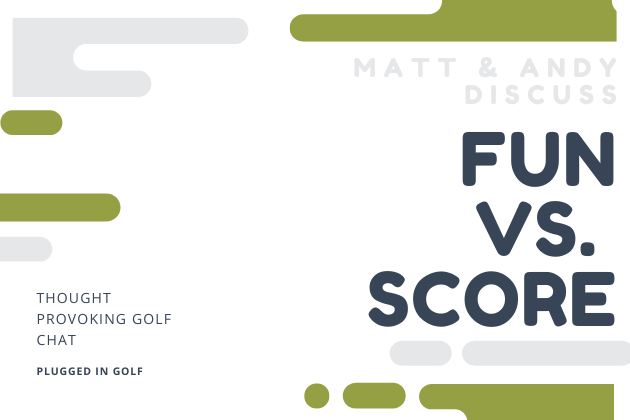
In this second installment of what may become a series, Matt and Andy discuss a golf topic they find interesting or important. This isn’t an interview or a debate, just a conversation that occurred over email so that it could be shared with you. If you like it, let us know in the comments. If there’s a question you’d like to see discussed, share that, too. Thanks.
Matt: A thought that I’ve had in my head for a few years is that playing golf for score and for fun are not compatible. I think people should pick a lane.
Score casts a giant shadow over the game of golf. When you check in at a golf shop, they hand you a scorecard. Golf media drowns you in messages about breaking certain scoring barriers. Professional golf – the most visible branch of the game – is entirely about score. Virtually every golf product is sold with the implicit or explicit promise of helping you score better.
Because of this, I think that golfers who want to maximize their enjoyment of the game should abandon score completely. I see too many golfers enjoy their time on the course then add up the numbers and suddenly become 20% less happy. It’s madness!
I’ve written dozens of times that I only keep score if I’m compelled. I play for fun. My goal is to hit every shot to the best of my ability. If I can string a few good shots together and make a birdie or two, that’s great. If I hit a bad shot or two, I’ll forget the score on the hole and just try to hit an enjoyable shot. And under no circumstance am I going to look back over a round, add up all the mistakes (which will definitely outnumber the birdies for 99% of golfers) and let them steal my joy.
What say you?
Andy: I agree — if you want to maximize enjoyment you should give up on keeping score. I also think playing golf only for enjoyment is an equally limiting perspective as playing golf only for score would be. Everyone starts caring a lot about score and lets the bad shots bother them too much. Most people never move on from this stage. You’ve gotten to a place where you rarely keep score and this helps your enjoyment. What if you could get to a place where you cared about score and you didn’t let the bad shots hinder your enjoyment?

Matt: There are several threads I want to pull on, but I’ll try to stick to one or two.
I think there’s a distinction – and it’s one I find important – between being bothered by bad shots and being bothered by the number at the end of the round. I think that even if we’re playing for fun, you should be a little bothered by bad shots. If we’re not bothered by bad shots, good shots aren’t much fun. I think that’s a natural extension of the idea that good golf is satisfying because it’s hard. Feel free to disagree with me on that.
To answer the question you posed: if we don’t care about the score – which necessitates letting it affect us, I believe – why keep it? Personally, I don’t keep score because the number annoys me. I’ve played golf at a scratch level, and it took a lot of work. I don’t choose to put that work into my game anymore, so my scores are worse than they “should” be.
Ultimately, I look at this from a practical perspective. What function is the score serving? For the golfer who is working to improve, the score can tell him something about how he played, if he’s on the right track, etc. That has value to that player, and it’s worth the potential (likely) negative impact on their enjoyment. I’m not working on my game, so what function does the score serve for me? That’s a genuine question, I’m very open to the idea that I’m missing something
Andy: Now might be a good time for some background – I’ve played competitive tournament golf. I’ve played golf for a season not keeping score at all. I’ve played for a season only playing match play. This past year I played hickory clubs and kept score every single round. So it sounds like we are alike in that we’ve both played for chunks of time keeping score, and not keeping score.
Here’s a thought experiment: let’s use playing guitar as a metaphor for golf. Everyone who plays guitar is at a different level. Some are beginners and some are experts. Regardless of where you are on this ladder, you have a piece of music you would like to play. You try to play the piece to the best of your ability. Sometimes you hit a lot of the notes, sometimes you make a bunch of mistakes. Either way, it brings more enjoyment to you when you hit more of the notes right. It sounds better, and you have a greater sense of accomplishment. This enjoyment and feeling of accomplishment is unique to each player. Everyone has a standard they set for themselves. A person preparing for a performance can get just as much enjoyment as a person who is playing only for themselves. I don’t think anyone would say they just enjoy strumming, and don’t mind if they miss notes or get off beat.
Now, there’s a couple ways people could get off track. Maybe they’re facing some outside pressure to play differently or better than they are interested in. Maybe the person is worried too much about what other people think of them. The person could be playing too difficult a piece i.e. holding themself to a higher standard than is realistic. In all these examples, playing the instrument would all of a sudden bring more stress than it’s worth.
Even though you’re not working on your game, score can simply be an interesting indicator of how you did that day. It’s part of the story. And it’s up to you whether you let anyone else in on the story. I saw in an article you kept score with a smiley face or frowny face for each hole. I would count this as keeping score! I know a guy who once kept score by the amount of airballs he had – literally, how many balls did he hit in the air!
The story of the round adds so much to my enjoyment. I shot a 77, but I was 6 over through 6. I had 2 smiley faces on the front, but 8 on the back. I had 20 airballs today, which was better than last week. I birdied the first two and held it together to finish under par. Golf is so unique in the depth of experience it offers us, and I think getting rid of score altogether makes golf a bit smaller than it otherwise could be.

Matt: A small correction: the smiley face score is not mine, it’s something I got second hand from a caddie who observed it. I do endorse the idea, though.
Regarding the guitar analogy, I think it serves my perspective more than it does yours. Playing the right notes is hitting good shots. No one doesn’t enjoy hitting good shots. No one enjoys hitting bad shots or notes. The question is whether you count up the right and wrong notes.
I will admit to feeling a substantial amount of frustration at your response, but I think that the problem is one of definition. In my initial conception of this question (which I did not share, which is my fault), “playing for score” is narrowly defined. And again, I fault myself for being imprecise with my language as I’ve veered between “playing for score” and “keeping score,” which are not necessarily the same thing. To me, “playing for score” means a few things. First, it requires playing strictly by the rules. More importantly, it means doing everything in your power to put the lowest number on the card. That means playing optimal strategy – aiming at the middle of the green, not taking on low percentage shots. It also means grinding out every putt. I’m sure this is fun to a certain segment of the golfing population. Some golfers play only to see their handicap go down, and more power to them.
When I say “playing for fun,” I’m talking about everything that isn’t what I just described. You can count birdies, smileys, airballs, or nothing at all. You can hit hero shots on some holes and strategically optimal shots on others. There are only two things you can’t do, according to me. One: claim a particular score at the end of the round, if you’re picking up putts, etc. Two: if you do count a score, strict or not, you can’t allow it to bother you.
Are we on the same page now or is there still a divide?
Andy: Ok, I think we are now getting somewhere! I like your distinction between “playing for score” and “keeping score.” I agree, playing for score at all costs, or playing only for score do not lead to having your best experience on the course. Playing with this purpose also tends to lead to worse scores as well.
I’m a huge believer in playing for more than just the score. Anytime I talk about score not being the most important thing, or playing golf for enjoyment, people assume this means I don’t try, don’t take golf seriously, or am just out there pretending to be happy when bad shots happen. Now maybe I should justt not care about what those people say, but there are a lot of them, and I think they, and golf as a whole, could benefit from seeing golf in a different way. So I think our language around all this needs to improve.
There’s so much more to golf that goes beyond fun and score. If you pay attention, golf is always asking you questions and offering insights into who you are as a person and how the world works. How do I respond to adversity? What tendencies hurt my performance? Can I be respectful to my playing partners when I’m having a bad day? Why are certain shots easy and others make be scared? What situations bring up self doubt? It also gives the opportunity to notice things. The beauty and architecture of the course. The miracle of pulling off an amazing shot. The unique feel of a perfectly struck iron shot.
When we care too much about the score, it’s really hard to see all these things. I don’t think it’s wrong to “play for fun,” but golf also gives the opportunity to learn about ourself, be confronted by our tendencies, and grow as a person. Is this fun? To me it isn’t always fun, but it’s definitely worth doing and a huge part of why I love playing golf more than just about anything else.
Matt: I don’t know if anyone else will enjoy reading this, but it’s been very helpful for me.
As we’ve gone back and forth, I’ve felt myself getting frustrated at some of your suggestions. I think that helped me to recognize a flaw in my initial idea, that being, “Why am I telling anyone else how to play?”
I think the fundamental question of score vs. enjoyment is still really important, but I’m hoping that I can prompt the reader to ask themselves what they enjoy about the game rather than trying to tell them anything at all.
A phrase I think we’re both fond of – affected as it may be – is “golf journey.” We’re all at different places along different roads. The fact that I’m not interested in score doesn’t mean I’m more or less evolved than anyone else. That you want to use golf to learn about yourself is not inherently better or worse than someone who doesn’t.
I think my last contribution to this thread will be something I picked up on TikTok a while back about different types of fun. I’ve found that there are actually several different versions of this from different academics, but I like this conception based on how people play video games. There are Achievers, Socializers, Explorers, and Killers. We may have parts of all of these in us at different times, or we may feel connected to just one. In either case, I find it an interesting framework for understanding our enjoyment and thinking about how we can get the most fun out of our golf.
Andy: Yes, I also hope this helps people ask questions of themselves. If you can figure out your real reasons for playing you’ll be able to ask yourself, “How’s this working for me?” From there you can make any adjustments and golf will become more enjoyable, engaging, interesting, and just about anything else you would like it to be.
More from Matt & Andy
He founded Plugged In Golf in 2013 with the goal of helping all golfers play better and enjoy the game more.
Matt lives in the northwest suburbs of Chicago with his wife and two daughters.
- Performance Golf Click Stick Training Aid Review - October 18, 2024
- Callaway Opus Platinum Wedge Review - October 17, 2024
- When to Take a Break from Golf - October 15, 2024














7 Comments
Interesting read. I’m kinda thinking that I can do both…. play for score and play for fun. My “goal” when starting out is usually to break 80. However, at my age (70) this doesn’t happen most of the time. It usually doesn’t take long into a round to realize if that goal is a possibility that particular day – or not. When that goal fades – now it feels like the focus is to just play each hole as well as I can – with the freedom of some experimentation thrown in. If I do pull off a good shot – this sort of rejuvenates an enthusiasm for the next hole – and so on. Regardless, I can still have fun with golf that day – even when my game is off a bit. That initial “goal” was only something in the back of my mind to “shoot for”…. not an all consuming attitude. If I’m playing by myself I will usually keep the score (unless I see that this needs to be called a “practice round.” But, I have no problem at all in leaving scorecards behind if I’m out with a daughter or a grandchild. I just love the game… and I can play it many ways. Bobby Jones said something to the effect of, “the enjoyment of golf is not in the accumulation of a score – but, in the execution of it’s shots. “. I agree.
To me the key is are you reporting a score for handicap. Many good players don’t need a scorecard (esp on their home course) because they can track how they stand in their head most of the time. Even if I wanted to not keep score, I bet I would recreate my score on the drive home or even during the back 9 and then I’d be tempted to report it. I guess if I just decided I wasn’t going to report any scores for the season, that would allow me to truly let go.
Thats why I actually like hitting balls on the range better than playing. No score keeping, enjoy hitting balls and good shots and you are done in a half hour. Doesn’t take up your whole day.
Does enjoying golf lead to a good score or does a good score lead to enjoying golf?
interesting conversation guys. I think I fall under the Achiever category of game players.
My love for the game has always been about the skill involved and the execution of shots. I’m always looking to improve those things that will allow me to hit more good shots and a variety of types of shots. I’m not separated from scoring, but if I execute the shots then the score takes care of itself.
The most miserable I’ve ever been with golf was when I was chasing a scratch handicap. I was down to a 3 and if I didn’t shoot 76 or lower I was p*ssed off for the rest of the day. I finally realized that it just wasn’t worth it and dialed back to just trying to hit good shots and let the score fall as it will.
I will grudgingly accept a good miss that allows me to score, but really what really turns me on is hitting the shot the way I intended – strike, line, trajectory, shape, etc.
As Jimmy Dugan said “It’s supposed to be hard. If it wasn’t hard, everyone would do it. The hard… is what makes it great.”
Great conversation with a lot of thoughtful back and forth and comments. I’m 72, 7.7 index (once as low as 3.7, fifteen years ago) at what is thought of as the toughest track in Tucson (so I’m lucky enough to play all year round). Look–the obsession with scoring really begins with labelling a hole par 3, 4, or 5 !! Over the years I’ve migrated from the back tees to whatever tees play around 6100 yards. I know that on any given day I will likely shoot somewhere between 76 and 82 depending on the quality of just a few shots and/or a few putts. Sure I feel like I’ve had a “better” outing if my round is below 80, but it has boiled down for me, that playing golf is not about shooting a number on any given day but about the fun of accomplishing 4-6 “pured” shots whether they determine a low score that day or not. My coach disagrees with me and so will many others. But—- throwing a 170 yard 7 wood into an elevated well defended green to 4 feet, a sand save or two, two putting from 60 feet on a double tiered green, or draining a steeply downhill breaking 10-12 footer beats putting a low number on the card at the end of the day in my book. Sometimes it happens, sometimes it doesn’t, but who cares— it’s sunny, 70 degrees in December, I’m walking 18, and my feet are above ground.
Very interesting conversation all the way around. I was reflecting on the video game types. I saved the princess, made my fastest lap time, and I love guitar hero even on a bad day. For me it’s all about having fun. I’ve spent a lot of time on the golf course not having fun, and that raises the question about playing golf for the love of it, even on a bad day. Fun or not. I like to keep score, but if I’m not playing well through the first five or six holes; then I regroup. Plan A is to use the remaining holes on the front nine as a warm up for a good back nine. If that fails, my fall back is to count pars or better, shooting for a 10. Personal note, I’m taking Matt’s advice and buying Shot Scope (X5). I’m excited about that.